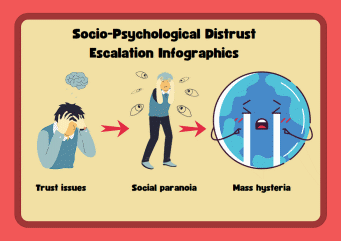Introduction
Have you ever noticed that you are a less trusting person than, for example, your parents, grandparents, or older acquaintances? Did it surprise you that the older generation feels less nervous around strangers and unfamiliar environments and is more confident about the country’s major topics? Many of you may have such concerning yet intriguing thoughts regarding the psychosocial well-being of society in the United States. Here, I will satisfy your curiosity by informing you about the higher rates of socio-psychological trust issues in youth compared to other age groups, such as Baby boomers and Gen Xers. The truth is that behaviors associated with distrust, such as trust issues and paranoia, are high in the younger generation toward their peers and fundamental social institutions in the Western hemisphere, and these continue to rise. Mental problems with reliance among Millennials and Zoomers, their social paranoia towards aspects of the state, and hypothetical innovative solutions will be discussed further.
Issues with Reliance and Confidence in Young People
One of the hallmarks of the current generation of teenagers and young adults is the high prevalence of trust issues. By systematically comparing metadata, Bailey and Leon found that middle-aged and older people are comparatively more trustworthy and hopeful than their descendants (2). They state that “older adults showed greater trust than young adults when presented with negative indicators of trustworthiness or in non-financial expressions of trust in response to positive indicators of trustworthiness” (15). Moreover, the duo of researchers notes that they were “also more trusting than young adults in response to neutral indicators of trustworthiness, however, this was only evident in their self-reported and nonfinancial trust” (15). Comparisons show lower trust in the younger part of Western society, which is indicative of the widespread and rooted trust issues of varying severity. These eventually manifest themselves in relationships with the vital state structures and the socio-political sphere.
Do not get me wrong; just like you, I think it is the right and healthy attitude to be skeptical and doubtful about fundamental institutions and their actions. However, when healthy skepticism is mixed with major trust issues in a significant part of society, it can escalate into social paranoia. It can result in mass hysteria and lead to various national catastrophes. Many Millennials and Zoomers are already expressing substantial insecurity about the competence of people in charge of law enforcement, finance, and the military (Gramlich). According to Jamison et al., distrust among minority communities is even higher than among average young white Americans (87). The recent COVID-19 has served as a booster for these negative socio-psychological attitudes the way it has forced people. Experts argue that social isolation and loneliness boost trust problems with people and institutions (CQ Researcher 16). As you can see from the image (fig. 3), disaster is rising and needs a novel and practical solution.

Fortunately, sociology and psychology can offer practical initiatives to prevent widespread social paranoia and increase confidence in young people. One of these is an innovative placebo treatment program that directly enhances people’s social trust through the nasal spray of fake oxytocin (Yan et al. 5732). The evidence of their effectiveness also already exists, which is very encouraging (Yan et al. 5732). Scientists hint that their intervention can serve as a basis for designing similar prophylaxis and healing initiatives (Yan et al. 5732). The problem is known as well as the tools and resources to solve it, so we need to act.
Conclusion
Here I have told you all about the sociological problem that continues to concern me. The Western hemisphere, the United States specifically, may face massive social paranoia or even hysteria in a decade or two as today’s youth have far more trust issues with their peers and country than their predecessors. Placebo treatments are cost-effective, resource-intensive interventions, and we must build confidence in young people with these. The psychosocial well-being of each member of society is interconnected with others, and our societal duty is to keep people around us healthy mentally.
Works Cited
Bailey, Phoebe E., and Tarren Leon. “A Systematic Review and Meta-Analysis of Age-Related Differences in Trust.”Psychology and Aging, vol. 34, no. 5, 2019, pp. 674–685.
CQ Researcher. Issues for Debate in Social Policy: Selections from CQ Researcher. SAGE Publications, 2019.
Gramlich, John. “Young Americans are Less Trusting of Other People – and Key Institutions – than Their Elders.”Pew Research Center, 2019.
Jamison, Amelia M., et al. “You Don’t Trust a Government Vaccine”: Narratives of Institutional Trust and Influenza Vaccination among African American and White Adults.” Social Science & Medicine, vol. 221, 2019, pp. 87–94. 10.1016/j.socscimed.2018.12.020.
Yan, Xinyuan, et al. “Placebo Treatment Facilitates Social Trust and Approach Behavior.” Proceedings of the National Academy of Sciences, vol. 115, no. 22, 2018, pp. 5732–5737. 10.1073/pnas.1800779115.